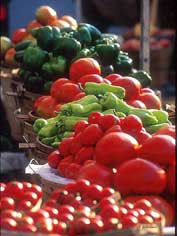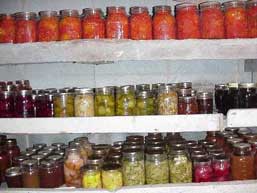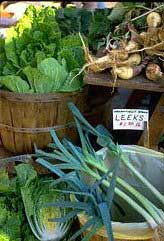Farmers Markets are an excellent way for consumers to enjoy fresh, great tasting farm products while stimulating the local economy and preserving small farms and local communities. Not only can the experience be fun and exciting, it also strengthens our connection to our food source and the people who grow it. Farmers markets in North Carolina are plentiful and with consumer support they may become more practical and convenient as a primary source of fresh, nutritious food.
This page provides consumers with helpful information on farmers markets and how to make the experience enjoyable and beneficial.
 Buying Tips
Buying TipsRealize that a farmers market is not a supermarket. Not all vendors accept credit cards. Bring small denominations of bills, including change, to make the transactions easier for the farmers. It’s also helpful to bring a basket or bags to carry your purchases. For the freshest and best quality produce, it pays to arrive early. Most of the high-demand items are sold within the first few hours.
Change your approach to shopping for food. Rather than going to the farmers market in search of ingredients for a particular recipe, browse through the entire market and use creativity in deciding how you may be able to use the produce that’s in season. Unlike supermarkets, you will mainly find only produce that is in season. Learn to “eat in season.” Become familiar with the varieties of produce available at certain times of the year.
Interact with the farmers. Farmers are usually very eager to share information on how the food is grown and the best way to prepare, store, or preserve it. Some may offer information on their farm and farming practices. The more you know about the food and how it was produced, the better you can appreciate the amount of time and work that goes into farming. This will also help you better understand farmers’ pricing system.
 Storing, Preparing and Preserving
Storing, Preparing and PreservingBuying farm products at farmers markets often means developing new ways to store, prepare, and preserve foods. Buying in volume is often cheaper and more economical. However, it also requires that you have the time, equipment, and knowledge to process the food properly before it spoils. Acquiring new ways of cooking with fresh farm products makes it easier for a family to use locally grown food as a primary food source. Proper knowledge about how certain foods should be stored increases their shelf life and reduces spoilage. Learning how to preserve food through various freezing and canning methods makes it possible to enjoy fresh farm products year round. The farmers who grow the food are often the best source of information on these topics.
Listed below are useful web sites with useful information on storing, preparing and preserving fresh farm products:
http://www.canning-food-recipes.com/canning.htm
https://randolph.ces.ncsu.edu/canning-and-preserving/
In addition to serving as a place of business, farmers markets often serve as community centers providing education, entertainment, and activities for young people among diverse members of the community. Some farmers markets offer cooking demonstrations or workshops on canning and preserving. Some provide entertainment in the form of live music or festivals at different times of the year celebrating a harvest season (blueberry, strawberry, peach, and turnip festivals). Activities for children, such as story telling and other educational activities, are also common. Interacting with farmers enables us to put a face to our food. Meeting up with friends, family and community are other reasons why people come to farmers markets.
 Special Programs
Special ProgramsMany farmers markets have developed special assistance programs in conjunction with local and federal agencies to serve low-income families and the elderly population. There is a strong need for affordable and nutritious food among these populations and farmers markets can provide ways to make these foods more accessible. Many farmers markets are USDA certified to accept food stamps. In addition, many participate in the Farmer’s Market Nutrition Program (FMNP) for Women, Infants and Children (WIC). Through this program, WIC women receive coupons to be used only at farmers markets for the purchase of fresh fruits and vegetables. For more information on the Women, Infants, and Children Program (WIC), please visit: http://www.fns.usda.gov/wic/